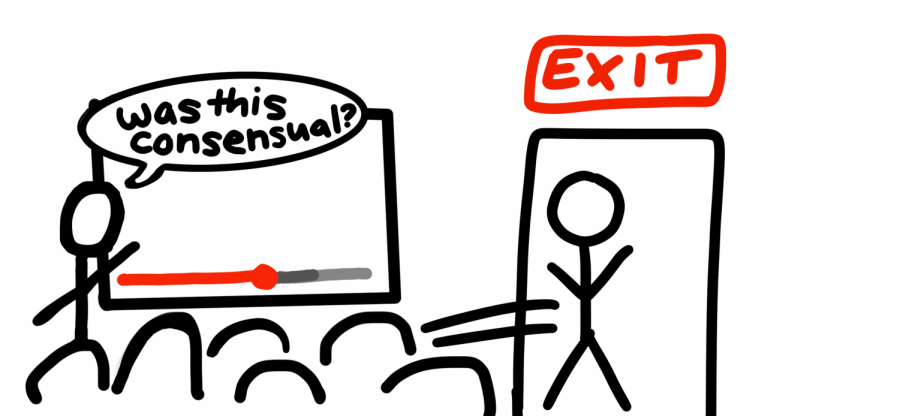Sexual assault discussions at Urban: Are they survivor-centric?
A look into the sexual assault conversations in Urban health class
“Each year 434,000 Americans ages 12 and older are sexually assaulted,” according to a Planned Parenthood survey.
At Urban, 10th graders participate in a six-week health class, and 11th graders take part in a health U1, both of which spend a portion of the six weeks talking about consent and sexual harassment. While reflecting on their experiences in health class, some students have been left wondering who these conversations should be catered to versus who they are actually catered to: the survivor or everyone else?
“Some of the videos… showed… very triggering [situations] and I had to step out of the classroom,” said Claire Johnson, whose name has been changed to protect their anonymity. “I had a panic attack. It provoked a lot of emotion.”
Additionally, another student, Georgia Rogers, whose name has also been changed to protect their anonymity, felt similarly about the health class sexual harassment discussions. “For me, when we were watching some of the videos, and the teacher was going over, graphically, the definition of sexual assault, I had to step out of the class and… go to the counselors because I was reliving my experience and I wasn’t able to do any of my classes for the rest of the day,” they said.“I do not think [the sexual assault discussions at Urban] are survivor-centric.”
Shafia Zaloom, a health education teacher at Urban, talked about the reasoning behind using graphic videos in the classroom: “…the majority of people who cause harm and perpetrate assaults specifically don’t believe that’s what they’re doing when it happens. All the social sciences tell us that.”
While these discussions stir up past experiences and emotions, leaving the classroom is also an educational concern. “I think I left that class four times,” Rogers said.
“[It’s] my class time, when I could be learning,” said Johnson.
Another concern when leaving class for the sake of one’s mental health regarding sexual assault is how public and social the class is. “Just having to leave the class, I mean, yes [it was said] that you can leave the class but now everybody in that class knows I’ve had experiences with this [sexual harassment],” Johnson said.
In response to the question of how to help make survivors more comfortable during these sexual assault discussions, Zaloom said, “It’s tough. Typically someone will say to me, ‘I’d like to skip this class’ and we just make those arrangements.” She also said, “but I think people also feel torn, because they don’t want to skip the class, they want to feel that they’re a part of this and that they have the strength and the wherewithal to be present.”
Zaloom explains what the health curriculum is meant to be about in regards to sexual assault and impropriety. “People expect that people just knowing is gonna stop people from doing…” She also said, “In many ways for all kinds of reasons that have to do with context, cognitive-development, personal issues, all those sorts of things, it’s one thing to understand and know about consent, it’s education, but it’s not therapeutic intervention.”
Rogers, when learning more about what qualifies as harassment versus assault, said, “I think that [a lot of my experiences] probably could’ve been prevented from happening if we had learned what it was… in freshman year.”












